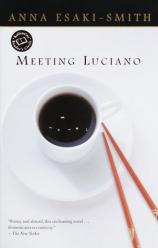Reading Group Guide
Discussion Questions
Meeting Luciano

1. This novel is unique in its ability to speak specifically to the immigrant experience as well as to universal notions of family and home. Of these two aspects, which did you find most compelling? Why?
2. Hanako is a storyteller. Her stories have entertained her children through the years and connected them to their heritage. In your family, is there a person who occupies this role? If so, have certain stories had significance in your life? Do you feel that these stories have connected you more deeply to your family? In what ways?
3. Hanako is eager for her daughters to marry, for she feels that without a male presence in their lives, she and her daughters are like islands. She believes that a man can give them family and relatives and make them part of something. Do you think that Hanako is conscious of the substance and unity that she, alone, has given her family?
4. Do you think Hanako is really interested in Alex? Or is he simply representative of an ideal?
5. Emily recalls a haunting childhood memory of spying her mother asleep on the bathroom floor after a party. "One early morning when I was eight years old, I found my mother on the floor of the hallway bathroom. From my bedroom, I had seen that the light was on. I peeked inside and saw her asleep on the pale gray tile, curled around the toilet. She was wearing a white flimsy nightgown, and her limbs were strangely askew, like those of a sleeping child. I stood at the doorway for a moment, mesmerized by the glowing peach walls and this apparition, looking more like a wounded fairy princess than my mother." (p. 137) This poignant experience of an eight-year-old girl witnessing her mother in such a vulnerable moment feels particularly significant in regard to the novel. Although Emily often envies her mother's passion and resolve, is it the image of her mother as the wounded fairy princess that keeps her at home by her mother's side?
6. Hanako is a proud woman who does not readily express her feelings to her daughter. Based on what we know about her character, how do you think she feels about Emily's choice to live at home after college? Do you think she is touched or shamed by it? Is she selfish for not encouraging Emily to move on with her life?
7. Scenes at the steakhouse provide an interesting aside to the events at the Shimoda house. Are there any metaphorical undertones at work there? Does the action at the steakhouse illuminate our understanding of the Shimodas in any way?
8. Do you think that Hanako really believes that Pavarotti will come to her home? What does her insistence reveal about her? What about Alex? Do you think he really believes that Pavarotti is coming? If not, why does he play along?
9. How do you feel about Hanako's obsession with Pavarotti? Does she cross the boundaries of healthy fantasy?
10. Emily talks about her inability to "infuse things with meaning" in her life. The author has stated that she believes that this affects most people at some point--and that dealing with that is the main motivational force in life. Does this idea hold validity for you? What are the obstacles that can prevent us from infusing things with meaning? Do you have a relevant personal experience that you can relay?
11. The novel is filled with touching scenes and moments. Are there any, in particular, that stood out to you?
12. Emily states, "And standing there, looking out the window, my father exhaling deeply on the sofa, my mother puttering around the kitchen, I'd feel as distant from my family as from the strangers living across the street. It never occurred to me then that my father and mother, too, could be experiencing something private, the vast past of their lives hurtling through their minds and distilling into that one Sunday afternoon." (p. 93) Can you recall a similar experience in your own life--when you first realized that your parents were their own separate entities?
13. If you could write an epilogue to the novel, where would we find Emily and Hanako five years later? What would their lives be like?
Meeting Luciano
- Publication Date: April 4, 2000
- Paperback: 272 pages
- Publisher: Ballantine Books
- ISBN-10: 0345436822
- ISBN-13: 9780345436825






